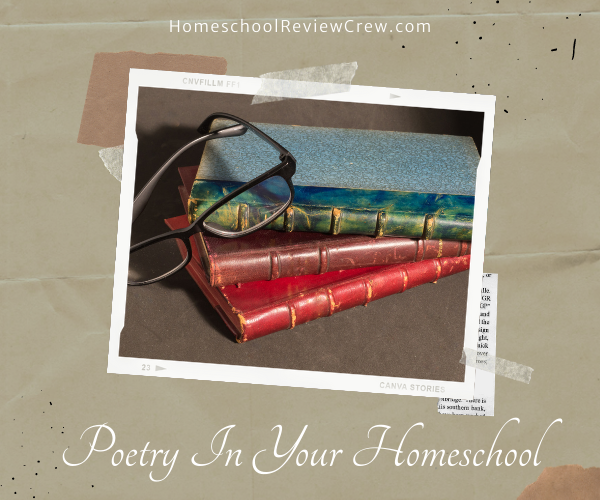One of my joys in life is the reading of good poetry (and hopefully the creation of good poetry). I come from a family that does not appreciate poetry though . . . so . . . we’ve needed to be creative in the poetry department in this household.

So how does one add poetry into a household that would rather not do poetry?
Why Study Poetry?
First, let’s talk about WHY you would want to add poetry into the lives of your children.
God included poetry in his Word. You’ll find Psalms, Proverbs, Job, Ecclesiastes, are books of poetry. You’ll find poetry in the other books of the bible as well. Descriptive, evocative language.
Therefore, adding poetry fits don’t you think? If God uses it to help us to better understand him, perhaps poetry teaches us something in and of itself?
There are other reasons to consider adding poetry other than God’s inspiration.
- Help your children develop their inner ear, to use imagination with the written word, to fill in blanks not directly spelled out, to develop those reflective senses.
- Help your children cultivate the beauty of the written word. Learn to love how words are put together to paint a picture.
- Help your children appreciate the style of different word artists. To learn what makes an Emily Dickinson poem different than an Edgar Allan Poe poem. It’s good to appreciate the styles and topics of different artists.
- Help your children learn to express themselves with subtle and precise language. Increase their skills at using a variety of words well.
How to add poetry to your homeschool
Let’s go through some ideas, shall we?
Read Aloud
It’s the simplest, easiest way to add poetry to your homeschool—read aloud. Read as a prelude to lunch, or during lunch! Read while they play on the floor around you. Add a poem to your bedtime routine. The point is simply to read and occasionally to ask a question. Not often, just enough you know they are listening. Read good poetry, read horrible poetry, read the fun and silly poems. Just read and let words sink in.

Natural inspiration
Take a book filled with nature poetry along on your next forest walk and read a short poem while observing the lake or an insect crawling in the grass. Fit your poetry to where you are. Then ask simple questions that broaden their thinking . . . just for a moment. Let the beauty of the words seep into their hearts.
Re-create it Challenge
Read a poem that paints interesting word pictures without being too specific and challenge them to re-create it in lego, drawing, painting, playdough, clay, a play, or whatever works for them. All you are doing is encouraging them to make the words of the poem their own or to at least, interact with the poetic form.
Tell the Story, Character Description
Read a really interesting book with great characters and having your child/ren make a poem that describes one of the characters, or even gives a short synopsis of the story. You can use this time to teach actual form, or just let them be free form.
Poetry Teatime
Do your poetry as a once-a-month poetry teatime. Read a good poem, and have your teatime centered around the theme of your poem. Teach additional skills such as having a conversation around a table, good manners, and more. Add a crafting time if it suits your children.

Teach Specific Poetry Styles
Teach the similes, the haikus, what makes an epic poem, or a dramatic one; free form and styled poetry; cadence, rhythm, and rhyme; word flow and irony and sarcasm; beauty and the art of words.
Share your Own Creations
For every challenge, you give your children, fulfill it yourself, then share your poetry with them. Even if it’s awful, share. Enjoy the laughter, the encouragement, and even the boos. Be real with your children, because poetry . . . it speaks to the real, it speaks to the connections found between people and the words they use, and it speaks to the emotional, evocative words that bring out the beauty and sorrows of life.

Share poems with your children. Make it a part of your schoolwork. You won’t regret it!
Thank you to Annette @ A Net in Time for writing this Crew Article.
Let’s Encourage Each Other!
Do you include poetry in your homeschool?
We’d love to hear from you! Comment below.
